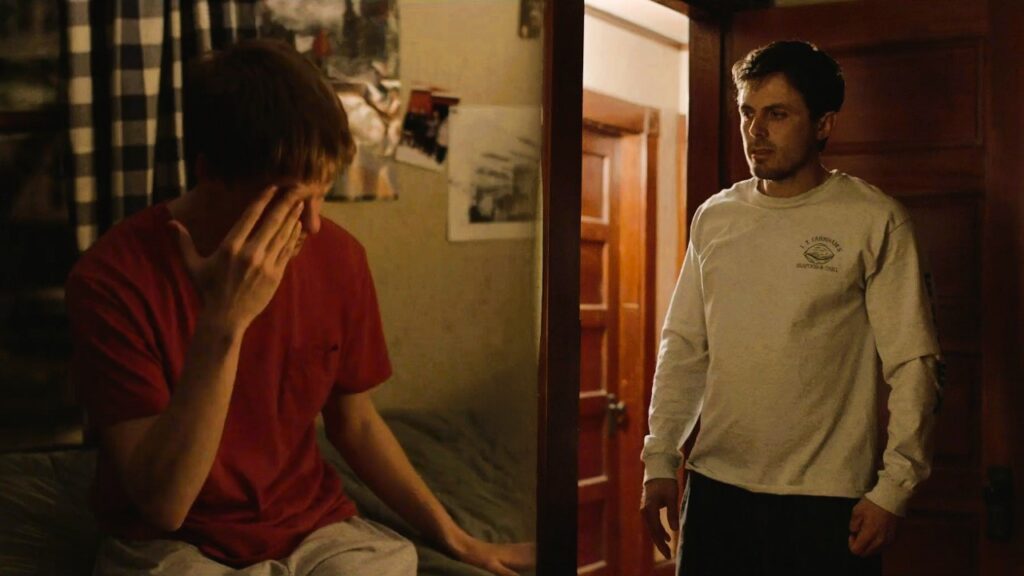This post includes a brief plot explanation, an analysis, and a review of the 2016 film “Manchester by the Sea”. Beware of spoilers.
Note: “Manchester by the Sea” will always hold a special place in my heart. Although I watched it for the first time many years ago, I was never able to forget Lee Chandler’s story.
Short Review: Despite being a drama, “Manchester by the Sea” is a very enjoyable film to watch. The story is very simple, but the characters are complex. One of the aspects that I really liked about “Manchester by the Sea” was its fine balance between drama and comedy.
Directed by Kenneth Lonergan, Manchester by the Sea (2016) is a drama starring Casey Affleck as Lee Chandler and Lucas Hedges as Patrick Chandler.
“Manchester by the Sea” tells the story of a man who returns to his old hometown, forcing him to confront his painful past.
Our protagonist, Lee Chandler, is living a quiet life in Quincy, but fate has other plans. His brother, Joe, has just passed away. This unfortunate event pulls Lee back to his hometown, Manchester-by-the-Sea. Not only does Lee need to take care of the funeral, but he has also become the legal guardian of his nephew, Patrick.
Returning to the old fishing town feels like ripping open an old wound for Lee. He once led a happy life here. During those happier days, he had a loving wife and three beautiful children. However, due to his own carelessness, he lost it all in a tragic house fire. The children are gone, but his now ex-wife survived.
Now, Lee faces an impossible choice: stay in a place that reminds him of everything that he has lost or leave his nephew.
The family has to “halt” Joe’s burial due to the cold winter. Meanwhile, Lee reluctantly settles into temporary guardianship. Uncle and nephew clash and connect as they try to navigate their new reality. Lee wants to move back to Boston, but Patrick resists his plans because he is deeply rooted in Manchester.
Amidst this turmoil, Lee encounters his ex-wife, Randi. Unlike Lee, she has apparently moved on. During their brief encounter, Randi apologizes for her cruel past remarks. Lee can’t help but reminisce about the painful past, which later spirals into a bar fight.
The film ends with a bittersweet compromise. Lee will move to Boston, but he’ll rent a place with an extra room for Patrick to visit. As uncle and nephew fish on Joe’s boat, the future remains uncertain. While Lee’s solution is not perfect, there is a hint of hope, healing, and change on the horizon.
“Manchester by the Sea” has a very poignant message for its viewers: it’s hard to move on from past trauma.
Lee Chandler is not a heartless uncle who doesn’t want to take care of his nephew. As the man said himself, he “can’t beat it”.
The harsh truth is, Lee doesn’t trust himself enough to do it. But Patrick doesn’t realize the extent of his uncle’s trauma until the very end. The turning point for Patrick was seeing Lee all beat up after getting into a fistfight with a random stranger at the local bar.
“Manchester by the Sea” follows a non-linear narrative.
The film bounces between past and present moments, gradually revealing the tragic backstory of Lee Chandler. As a viewer, I thought the non-linear structure was perfect for a story like “Manchester by the Sea” because it keeps the audience more engaged.
By strategically withholding key information about Lee Chandler’s past and releasing it slowly through carefully placed flashbacks, it allows the viewers to sort of “experience” the emotional journey that Lee went through.
Moreover, the “fragmented timeline” reflects the disjointed nature of grief itself, echoing Lee’s inability to move forward in his own life. Memories and trauma are not linear, people relive them in a back-and-forth manner, which is perfectly mirrored by the non-linear storytelling style.
Lee Chandler is a man tormented by guilt, grief, regret, and even shame.
After losing his children, Lee stopped living. Despite looking like a regular individual, Lee is “dead” inside. There is a void in his heart. All those feelings of shame, guilt, and self-hatred have eventually morphed into something else.
In order to escape from his personal tragedy, Lee moved to another town. Ever since then, Lee made a commitment to punish himself for what happened. I mean, how could one explain why Lee chose to live in a tiny basement instead of a proper house?
Also, of all the jobs in the world that Lee could have chosen, why become a janitor? Don’t get me wrong, there is nothing wrong with the profession itself, but is it the only available option for Lee? Probably not.
In my opinion, a lot of Lee’s lifestyle choices after his divorce reflect his intense guilt and self-hatred. It’s no coincidence that Lee is still single. The man has options, yet he chooses to stay alone. It seems that Lee doesn’t believe that he deserves to be happy after that fateful night.
While Lee Chandler is stuck in the past, Randi decided to move forward.
Despite experiencing the same trauma of losing their children, Randi was able to move on, or at least she tried to. The woman has a new husband and a new baby. After the fire, Randi said a lot of spiteful things to Lee, to which she deeply regretted.
Randi’s apology to Lee hints that she still has a lot of love for her former husband. Although they are no longer together, Randi still wishes Lee to live a good life. Sadly, Lee doesn’t think he deserves happiness.
The ending of “Manchester by the Sea” shows a glimmer of hope for Lee Chandler towards healing from his demons.
After his brother’s funeral, Lee Chandler decides to leave Manchester-by-the-Sea and move to Boston. He simply cannot stand the idea of staying in the same place where his children died. Nevertheless, this time, Lee is trying to change some aspects of himself.
Does this mean that Lee is healed from his trauma? No, but he is trying to hold on to what is left of his family—Patrick. Having said that, the extra room at his new place represents Lee Chandler’s willingness to reconnect with his nephew.
At the time, the uncle only wants to be a “crutch” for his nephew. Lee Chandler is not trying to be a parental figure in Patrick’s life, just someone who is there whenever his nephew needs him. That mindset might also explain his lax attitude when Patrick informed him that he was not going to pursue a higher education.

Lee Chandler and Patrick Chandler’s conflictual relationship stems from poor communication.
Throughout the film, Lee Chandler and Patrick Chandler fight a lot. However, those heated arguments do not come from a place of anger or hate, they just don’t know how to express their feelings. There are a lot of things about Lee that Patrick misreads and vice-versa.
On one hand, we have an emotionally numb uncle who is still grieving his past, and then on the other hand, there is an “angry teenager” who is dealing with his father’s passing.
Patrick doesn’t really understand why his uncle chooses to be miles away from Manchester-by-the-Sea when he could be doing the same job (janitor) in his hometown. Also, Patrick feels that his uncle doesn’t love him enough to take care of him. But in reality, it’s actually quite the opposite.
After the tragic incident, Lee pushed everyone that he loved away, including his wife, his brother, and his nephew.
Lee being emotionally distant from his family does not mean that he doesn’t love them. Part of him believes that he does not deserve to be loved, hence, his insistence on keeping a distance from his loved ones.
Now, in what ways does Lee misinterpret Patrick? First of all, he believes that Patrick has everything that he wants and needs. The boy is popular at school, has two girlfriends, and on top of that, he is in a band. So why on Earth would he need his uncle? But after Joe’s passing, Patrick needs his uncle more than ever.
The “frozen chicken” scene is a great example of how Joe’s death is affecting Patrick. Despite looking seemingly fine after his father’s death, Patrick is not okay. This is just an opinion, but people that cry after seeing frozen chicken need help.
When uncle and nephew sat down during dinner, that was indeed their most honest interaction. Patrick is confused and heartbroken when he learns that his uncle will not stay in Manchester-by-the-Sea. However, this time, Patrick learns the difference between “not wanting” and “not being able to”.
Towards the end of the film, Patrick learns that his uncle wasn’t trying to reject him during this entire time. The truth is, Lee doesn’t trust himself enough to take care of his older brother’s child. The idea alone terrified him because it brings back memories of losing his children in the fire.
Final Thoughts
Some people might dislike the ending of “Manchester by the Sea” because it leaves many questions without an answer. Personally, I found the whole experience very rewarding, even with that open ending.
The ending of “Manchester by the Sea” might not give the closure that the audience was looking for, but I actually prefer it that way. As I said before, Kenneth Lonergan wasn’t trying to please his viewers with a happy ending.
Watching uncle and nephew fishing on Joe’s boat and not knowing what happens next was indeed a more realistic ending. People like Lee don’t just move on from their past tragedies. Not because they don’t want to: they are not able to.
Both Casey Affleck and Lucas Hedges were able to deliver strong and convincing performances as Lee Chandler and Patrick Chandler, respectively.
Having some comedy injected into the drama made it easier to watch. On one hand, we have the tragedy coming from Lee’s background story and Joe’s death. But on the other hand, we also have the hilarious moments coming from uncle and nephew interactions.
Overall, I believe that “Manchester by the Sea” is a very noteworthy watch. It has everything that an audience can ask for: good acting, a good story, and some bits of comedy. Life itself is also composed of sad and happy moments, and the film manages to capture that essence perfectly.
Final Rating: 




